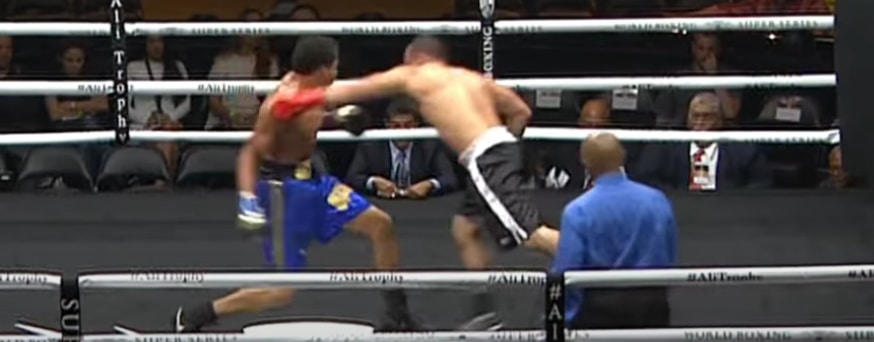
A superman punch is one of the flashiest moves in martial arts. So if you’re looking to add some style to your boxing game, should you consider practicing it? Moreover, is it even legal in boxing?
You can throw a superman punch in boxing. The only component of the blow that might seem questionable at first blush is the jump, but there isn’t a rule that says that you can’t jump while hitting your opponent.”
Now that we’ve established its legality, let’s look into its practicality. You can perform a superman punch in boxing, but should you?
How to Properly Perform a Superman Punch
Before digging into its usefulness, let’s explain the move.
A superman punch begins with the fighter feinting a rear kick to the body or leg. As their opponent reacts to this threat by lowering their guard, the fighter brings their rear leg back, shuffles their lead foot forward, and throws a rear hand (typically across) over their opponent’s guard.
Footwork is the key to success here. Much of the superman punch’s force comes from the weight transfer between kicking your rear leg back and launching your rear hand forward. Also, remember to hop forward with your lead foot. Without that slight shuffle, you won’t be in range to land your punch and you may leave yourself exposed to a counter after your blow falls short.
Finally, remember that the goal is not to merely jump up but rather to jump toward your opponent. Since this move takes more time to execute than a conventional punch, you want to close the distance as quickly as possible. Otherwise, they will easily dodge or counter your rear hand.
Why Boxers don’t Throw Superman Punches
Obviously, kicks aren’t allowed in boxing. As such, no experienced fighter is going to react to a kick feint because that’s not a viable weapon in the sport. This means the superman punch, while completely legal, is nearly useless in a boxing setting.
If you decide to attempt this technique anyway, your opponent will ignore the threat of a kick and focus exclusively on the punch. As we discussed earlier, a superman punch is slower to pull off than a grounded punch. It won’t be difficult for your opponent to slip out of the way and counter your shot by the time your feet land on the ground.
It’s simply not a practical move to try in a boxing ring.
Frankly, it’s extremely rare to see a superman punch in high-level boxing. The closest example that comes to mind occurred in the 1985 bout between Julio Cesar Chavez and Roger Mayweather. In the second round, Chavez was applying furious pressure and walking through his opponent’s punches.
Mayweather couldn’t keep Chavez off him. Eventually, Chavez connected on a massive overhand that staggered Mayweather. As his opponent tried to move out of range and recover, Chavez launched a flying right hand that sent Mayweather to the canvas.
Chavez would ultimately knock Mayweather down three more times in that round before the fight was called in his favor.
Granted, Chavez didn’t perform a true superman punch because he didn’t feint with his rear leg or kick it back. This was more of a leaping rear hand to catch an opponent who was trying to clear some distance.
To be honest, Chavez was only able to land this reckless shot because Mayweather was already dazed from the overhand. A fresher fighter would have no trouble defending against this punch. Also, this sequence showcased why a superman punch can put you in dangerous territory.
Your opponent can react more quickly than you can on account of their grounded stance, and you’re sacrificing your balance as well. Look at how Chavez stumbles immediately after lunging into his punch. This was a desperate, all-or-nothing attempt.
Unless your opponent is running on fumes, a superman punch isn’t much of a threat. Even under those circumstances, you’d be better off sticking to more conventional punches to put your opponent away.
Why MMA fighters do throw superman punches
Unlike in boxing, kicks feature prominently in mixed martial arts. Consequently, superman punches are more viable in this sport. If a fighter has been stung by kicks throughout a contest, they’ll have no choice but to eventually react to the feint involved in a superman punch. That motion with the rear leg could freeze them, lower their guard and open them up for a devastating rear hand.
This move is useful because it’s unpredictable. Moreover, because you’re leaving the ground, you’re attacking from an angle your opponent may not expect. The rear hand is coming in from a greater height than your standard grounded cross.
While any fighter can land a superman punch, it’s perhaps most valuable to strikers facing a taller opponent. Since they aren’t grapplers or wrestlers, they need to close the distance on the feet. That can prove difficult if their opponent is capitalizing on their reach advantage by sticking and moving.
If you find yourself in this situation, you’ll first need to make your opponent respect the threat of a rear kick. Make them believe you’re going to depend on this strike. When they decide to start defending your kicks, feint one and throw a superman punch over the top.
After that, you can follow up with some dirty boxing or clinch strikes. You should have the upper hand in close quarters because they can’t use their length from this range. If your opponent is a capable grappler, though, you may need to disengage before they get their hands on you.
Famous examples of Successful Superman Punches
The earliest documented superman punch came courtesy of Bas Rutten when he fought Kevin Randleman at UFC 20 in 1999.
GSP
UFC welterweight icon Georges St-Pierre is also famous for attempting this move often throughout his illustrious career. He didn’t necessarily use it as a home-run threat, but his timing, quickness and precision with the blow forced his opponents to consider a variety of weapons. That striking versatility, in addition to his superb wrestling, is why he became an all-time great.
In terms of superman punch knockouts, there have been two spectacular examples in the UFC over the past 10 years.
Travis Browne
At UFC 130 in 2011, Travis Browne ended his fight against 7’0” giant Stefan Struve with a brutal superman punch. As we mentioned earlier, this technique is great for the smaller fighter.
Browne gave up five inches in height and significant reach, but his timing allowed him to connect on a huge fight-ending shot. While standing at kicking range, Struve tried to counter Browne’s rear leg with one of his own. Unfortunately, Browne was merely feinting to set up his right hand. Before Struve could even react, he was out cold.
Anthony Pettis
More recently, Anthony Pettis added to his highlight reel with a superman punch knockout against Stephen Thompson at UFC Fight Night 148 in 2019. His version of the move was rather ingenious. In the second round, Thompson backed his opponent to the edge of the Octagon and landed a side kick.
Pettis used that backward momentum to propel himself off the fence and toward Thompson. In anticipation of a rear kick from Pettis, Wonderboy tried to backpedal and throw a right hand. Instead, Pettis came flying over the top with a looping right that caught an unsuspecting Thompson right on the button.
Other jump punches
While superman punches aren’t all that practical in boxing, there are leaping blows that can be effective in the squared circle. In fact, some of the greatest fighters of all time used what’s referred to as a gazelle punch.
Gazelle Punch
Rocky Marciano is a fighter often associated with the gazelle hook. This makes sense considering he boasted the shortest reach of any heavyweight champion in history. He needed a weapon that would allow him to close the distance against taller opponents. Otherwise, they would have landed on him without being exposed to return fire themselves.
He often initiated this move by ducking under his opponent’s jab and loading his weight onto his lead leg. From there, he would shuffle his feet forward to cover some ground and leap toward his target, twisting his hips to generate a great deal of force for his hook.
This punch became his calling card because of its deception. When Marciano changed levels, opponents now had to consider whether he was intending to throw a body shot or a leaping hook. Since it’s difficult—if not impossible—to cover all your bases defensively, this is a very useful weapon to have in your arsenal.
Middleweight legend Marvin Hagler is also famous for a leaping punch, but he stood out by opting for a jab instead of a hook. The reason he was so proficient with it is that he was able to switch stances at the drop of a hat. Combined with clever head movement, this made the timing of his gazelle jab a complete mystery to his opponents. They never knew when it was coming and they were never safe.
Furthermore, a jab is a straight punch. It can reach its target more quickly than a hook, so the odds of him connecting on his leaping jab were much higher. Finally, while this was a unique approach to the jab, it remained useful for setting up combinations as well. Hagler would stick you with a jab you didn’t expect and then unload a flurry of punches before you could even process the initial blow.
With that said, these aren’t punches you can throw indiscriminately since leaping toward your opponent will only increase the force of their strikes. You need to set up your gazelle punches and wait for the perfect opportunity. Throw some shots to the body, then go upstairs with a leaping hook later on.
Switch stances a few times, but don’t show the gazelle jab until the range is just right. Use these tools as curveballs rather than punches you put out there over and over again. This way, you can minimize risk and maximize the surprise factor.
What Techniques you Can’t Throw in Boxing
Unlike spinning backfists and headbutts, superman punches are entirely legal in boxing. They’re just not useful because the threat of a kick doesn’t exist in the ring. As such, fighters will focus their attention on the jumping punch coming their way and easily dodge or counter it.
However, there are leaping punches that you can add to your toolbox. The gazelle hook and gazelle jab can cover great distances and catch your opponent off guard. The former presents your opponent with threats at different levels, whereas the latter is most effective if you can seamlessly change stances and throw stiff jabs with either hand.
Keep in mind that your timing has to be perfect for both of these punches. If it isn’t, leaping toward your opponent could put you in a very compromising position.
